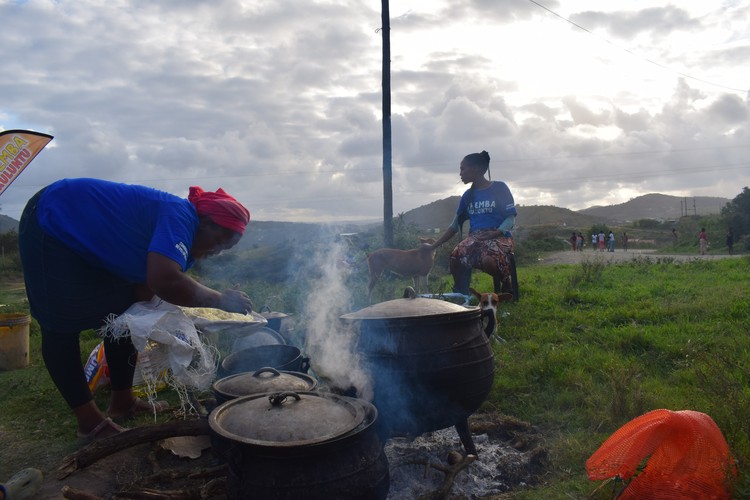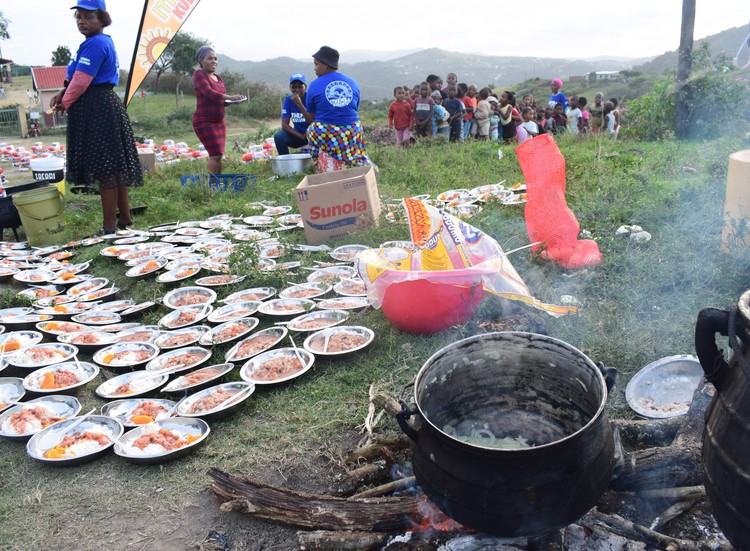Soup kitchen serves Eastern Cape children the only meal they’ll eat that day
The Human Rights Commission has recommended that child malnutrition in the province be declared a disaster
Ithemba Kuluntu volunteers cooking samp and beans to feed hundreds of villagers in Cwebeni in the Eastern Cape. Photos: Lucas Nowicki
It’s about 3pm in Cwebeni, a small village near Port St Johns in the Eastern Cape, and children and their mothers are lining up for what might be their only meal of the day.
Over a wood fire, four massive cast iron pots are filled to the brim with umngqusho (samp and beans), vegetables, and rice. The children are served first while their mothers wait their turn on the grass.
The community-run soup kitchen is supported by a new organisation called iThemba Kuluntu. The organisation aims to tackle the hardships caused by poverty, unemployment and government neglect across six villages in the area.
In Cwebeni alone, they serve between 400 and 500 meals a day, according to one of iThemba Khuluntu’s founders, TJ Hanneman. A handful of women volunteer their time to cook about four times a week.
Hanneman says local shop owners in Port St Johns donate some food, and food security organisations such as SA Harvest have recently come on board.
After the food was served, about 40 food parcels were distributed to families.
“This food plays a big role for our children because some of them go to sleep at night without food in their stomachs,” says volunteer Nomsa Mtholi, a 31-year-old unemployed mother of three. Hers is among the many families in the village who survive on a child support grant of R530 a month: according to Nosalathiso Petshana, a director of iThemba Khuluntu, very few people in Cwebeni have income outside of social grants.
With little prospect of finding employment, life in Cwebeni is very hard. Villagers complain about a lack of basic services. They say they have been forgotten by the authorities.
The organisation feeds between 400 and 500 people a day, several times a week.
In March, the SA Human Rights Commission (SAHRC) visited the village following “distressing complaints” of human rights violations in the area. Among the complaints reported was severe malnutrition and starvation.
Ntombizoxolo Gqetywa lives with 17 relatives who all survive on four child support grants. Towards the end of the month the family struggles to feed everyone. “Sometimes all we are left with is mielies. Sometimes nothing, just salt and oil,” Gqetywa told GroundUp.
In November, the SAHRC published an alarming report on child malnutrition in the Eastern Cape, which it said should be declared a state of disaster in terms of the Disaster Management Act. The SAHRC also called for the national and provincial governments to be compelled to intervene immediately, and for the child support grant to be increased above the food poverty line, currently at about R1,058 a month.
Support independent journalism
Donate using Payfast

Don't miss out on the latest news
We respect your privacy, and promise we won't spam you.
Next: Wits students set up Palestinian solidarity encampment
Previous: Thousands of people abandoned as the Gauteng Social Development Department implodes
© 2024 GroundUp. This article is licensed under a Creative Commons Attribution-NoDerivatives 4.0 International License.
You may republish this article, so long as you credit the authors and GroundUp, and do not change the text. Please include a link back to the original article.
We put an invisible pixel in the article so that we can count traffic to republishers. All analytics tools are solely on our servers. We do not give our logs to any third party. Logs are deleted after two weeks. We do not use any IP address identifying information except to count regional traffic. We are solely interested in counting hits, not tracking users. If you republish, please do not delete the invisible pixel.


